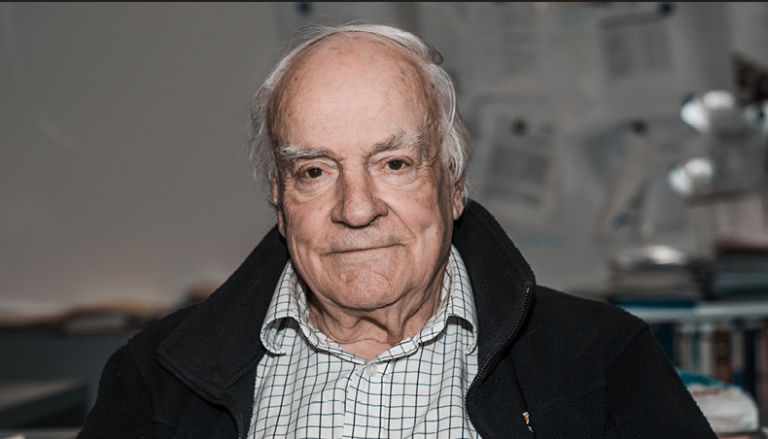Academic community shares tributes to Professor Avrion Mitchison
18 January 2023
Academics have paid tribute to UCL Emeritus Professor Avrion Mitchison FRS, a globally recognised pioneer in the field of immunology. Professor Mitchison, known as Av, passed away peacefully in December 2022, aged 94.

Prof Mitchison was both a Fellow of the Royal Society (1967), and an international member of the National Academy of Sciences, USA, (1990). He began his training in 1948 at Oxford University, under the tutelage of Nobel prize-winning scientist Professor Peter Medawar.He was a lecturer, later Reader in Zoology, at the University of Edinburgh 1956 to 1962, then Head of the Division of Experimental Biology, at the National Institute for Medical Research, Mill Hill, 1962 to 1971, before becoming Jodrell Professor of Zoology and Comparative Anatomy and director of the ICRF (now Cancer Research UK) Tumour Immunology Unit at UCL 1971 to 1991.
Av left UCL to become a founding director of the German Rheumatism Research Centre in Berlin (Deutsches Rheuma-Forschungszentrum – DRFZ), a position he filled until 1996. He established the DRFZ as an international centre of excellence, most notably through a clinical trial of oral tolerance as a treatment for rheumatoid arthritis.
On his retirement, Av returned to UCL for two further decades as Emeritus Professor, working within UCL’s Division of Infection and Immunity and Institute of Ophthalmology. He is also described as inspirational by the UCL Department of Genetics, Environment and Evolution, which embraces Av as a ‘luminary’, who has provided fundamental insights to evolutionary biology.
A lasting legacy
Recalling his days working with Av, Professor Benny Chain (UCL Institute of Infection & Immunity) said: “Av Mitchison was a major influence in guiding my professional life. He taught me about how to do science properly, with integrity and with generosity.
“The intellectual environment he created at UCL was exacting in Av’s demand for absolute honesty and clarity. But its legacy was not just a fundamental and far-reaching set of paradigm shifts in immunology, but a cohort of young scientists who dominated British immunology of the last decades of the 20th century.”
Av was a passionate advocate of science in general and immunology in particular. He was a founding member of the British Society for Immunology and a member of Academia Europaea. He received an Honorary Doctorate from the Weizmann Institute and in 1995 was awarded the Novartis Prize for Basic Immunology. In 2001 he received the Robert Koch Gold Medal honouring his lifetime achievements.
UCL Provost & President, Dr Michael Spence, said: “His long list of honours and awards speak to the academic esteem in which he was held by the global immunology community, but he was also a warm colleague who enjoyed a lively discussion and debate.
“Avrion’s astounding legacy will live on in many ways, not least through the Avrion Mitchison prize, encouraging young scientists to follow in his footsteps and change the world for the better.”
Pioneering scientific discoveries
During a long and distinguished career in the field of immunology, Av made fundamental contributions to the understanding of T lymphocytes in immunological regulation and tolerance. These discoveries in fundamental immunology had far-reaching consequences in tissue transplantation, autoimmunity, tumour immunology and vaccination whose influence can be seen up to the present day. Wherever he worked, Av fostered an extraordinarily exciting and fertile intellectual environment, which while certainly not for the faint-hearted, attracted and inspired a constant stream of young scientists many of whom became the leading immunologists of the next generation.
Former student of Av’s, Professor Nick Gascoigne, National University of Singapore, said: “His great gift to us, his students, was to open our intellectual horizons.
“He introduced me to so many remarkable people: the grandees of immunology, but also the upcoming stars, and the greats in other fields too. This helped so much in the future, for finding a postdoc and for building a network.”
Professor Peter Beverley (Imperial College London), who worked with Av for over 20 years, including at UCL as a member of the ICRF Tumour Immunology Unit, said: “Av’s idea of "supervision" of his colleagues and students was to let them get on with it and if they couldn't, I don't think he was really interested. On the other hand just being around him made one realise that this was a man who thought deeply about biology. It was a huge privilege to be exposed to his thinking and certainly influenced everything I did in immunology.”
He added: “He was incredibly generous with his time, his support of colleagues and unlike many modern lab heads never thought of putting his name on papers unless he had really contributed directly to the work. Apart from his contributions to transplantation immunology, mechanisms of tolerance and collaboration of T and B cells, Av will surely be remembered for the stimulus his ideas gave to so many immunologists during his time at NIMR, UCL and later as director of the German Rheumatism Research Centre in Berlin.”
Professor Trevor Owens (University of Southern Denmark), a postdoc with Av said: “Av was very generous with his time and ideas, and very good company. Some of his ideas were not easily amenable to experimental test but we always gave it a go, as did he – there were many discussions about I-J! He continued running his own experiments, sharing space with us in the mouse house, and would only co-author papers to which he contributed data. This gave me a last-authorship which I am sure helped my subsequent funding from MRC-Canada.”
Professor (Nicholas) Avrion Mitchison FRS, born 5th May 1928 and died 28th December 2022. His funeral will be held on January 21, 2023.
For more details please contact Professor Hannah Mitchison (UCL Great Ormond Street Institute of Child) h.mitchison@ucl.ac.uk.
Main image: Professor Av Mitchison on a visit to the DRFZ in 2014. Credit DRFZ.
 Close
Close

